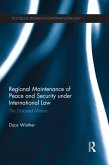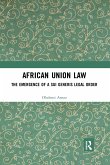James Crawford
Brownlie's Principles of Public International Law
James Crawford
Brownlie's Principles of Public International Law
- Broschiertes Buch
- Merkliste
- Auf die Merkliste
- Bewerten Bewerten
- Teilen
- Produkt teilen
- Produkterinnerung
- Produkterinnerung
Serving as a single volume introduction to the field as a whole, this ninth edition of Brownlie's Principles of International Law seeks to present international law as a system that is based on, and helps structure, relations among states and other entities at the international level.
Andere Kunden interessierten sich auch für
![Regional Maintenance of Peace and Security under International Law Regional Maintenance of Peace and Security under International Law]() Dace WintherRegional Maintenance of Peace and Security under International Law48,99 €
Dace WintherRegional Maintenance of Peace and Security under International Law48,99 €![American Apartheid: The Native American Struggle for Self-Determination and Inclusion American Apartheid: The Native American Struggle for Self-Determination and Inclusion]() Stephanie WoodardAmerican Apartheid: The Native American Struggle for Self-Determination and Inclusion16,99 €
Stephanie WoodardAmerican Apartheid: The Native American Struggle for Self-Determination and Inclusion16,99 €![African Union Law African Union Law]() Olufemi AmaoAfrican Union Law65,99 €
Olufemi AmaoAfrican Union Law65,99 €![Liberating Aboriginal People from Violence Liberating Aboriginal People from Violence]() Stephanie JarrettLiberating Aboriginal People from Violence30,99 €
Stephanie JarrettLiberating Aboriginal People from Violence30,99 €![Customary Land Tenure & Registration in Australia and Papua New Guinea: Anthropological Perspectives Customary Land Tenure & Registration in Australia and Papua New Guinea: Anthropological Perspectives]() Customary Land Tenure & Registration in Australia and Papua New Guinea: Anthropological Perspectives32,99 €
Customary Land Tenure & Registration in Australia and Papua New Guinea: Anthropological Perspectives32,99 €![A Hague Convention on Jurisdiction and Judgments A Hague Convention on Jurisdiction and Judgments]() Eva JueptnerA Hague Convention on Jurisdiction and Judgments98,99 €
Eva JueptnerA Hague Convention on Jurisdiction and Judgments98,99 €![Standoff: Why Reconciliation Fails Indigenous People and How to Fix It Standoff: Why Reconciliation Fails Indigenous People and How to Fix It]() Bruce McIvorStandoff: Why Reconciliation Fails Indigenous People and How to Fix It19,99 €
Bruce McIvorStandoff: Why Reconciliation Fails Indigenous People and How to Fix It19,99 €-
-
-
Serving as a single volume introduction to the field as a whole, this ninth edition of Brownlie's Principles of International Law seeks to present international law as a system that is based on, and helps structure, relations among states and other entities at the international level.
Hinweis: Dieser Artikel kann nur an eine deutsche Lieferadresse ausgeliefert werden.
Hinweis: Dieser Artikel kann nur an eine deutsche Lieferadresse ausgeliefert werden.
Produktdetails
- Produktdetails
- Verlag: Oxford University Press
- 9 Revised edition
- Seitenzahl: 872
- Erscheinungstermin: 9. Juli 2019
- Englisch
- Abmessung: 246mm x 176mm x 40mm
- Gewicht: 1483g
- ISBN-13: 9780198737445
- ISBN-10: 0198737440
- Artikelnr.: 55450644
- Herstellerkennzeichnung
- Libri GmbH
- Europaallee 1
- 36244 Bad Hersfeld
- gpsr@libri.de
- Verlag: Oxford University Press
- 9 Revised edition
- Seitenzahl: 872
- Erscheinungstermin: 9. Juli 2019
- Englisch
- Abmessung: 246mm x 176mm x 40mm
- Gewicht: 1483g
- ISBN-13: 9780198737445
- ISBN-10: 0198737440
- Artikelnr.: 55450644
- Herstellerkennzeichnung
- Libri GmbH
- Europaallee 1
- 36244 Bad Hersfeld
- gpsr@libri.de
James Crawford, SC, FBA, is a Judge of the International Court of Justice and formerly Whewell Professor of International Law, University of Cambridge and Fellow of Jesus College, Cambridge. In 2010 he was awarded the Nessim Habif World Prize by the University of Geneva and in 2012 the Hudson Medal by the American Society of International Law.
Part I: Preliminary Topics
1: Introduction
2: The sources of international law
3: The relations of international and national law
Part II: Personality and Recognition
4: Subjects of international law
5: Creation and incidence of statehood
6: Recognition of states and governments
7: International organizations
Part III: Territorial Sovereignty
8: Forms of governmental authority over territory
9: Acquisition and transfer of territorial sovereignty
10: Status of territory: further problems
Part IV: Law of the Sea
11: The territorial sea and other maritime zones
12: Maritime delimitation and associated questions
13: Maritime transit and the regime of the high seas
Part V: The Environment and Natural Resources
14: Common spaces and co-operation in the use of natural resources
15: Legal aspects of the protection of the environment
Part VI: International Transactions
16: The law of treaties
17: Diplomatic and consular relations
18: Unilateral acts, acquiescience, and estoppel
19: Succession to rights and duties
Part VII: State Jurisdiction
20: Sovereignty and equality of states
21: Jurisdictional competence
22: Privileges and immunities of foreign states
Part VIII: Nationality and Related Concepts
23: The relations of nationality
24: Nationality of corporations and assets
Part IX: The Law of Responsibility
25: The conditions for international responsibility
26: Consequences of an internationally wrongful act
27: Multilateral public order and issues of responsibility
Part X: The Protection of Individuals and Groups
28: The international minimum standard: diplomatic protection and protection of investments
29: International human rights
30: International criminal justice
Part XI: Disputes
31: The claims process
32: Third-party settlement of international disputes
33: Use of threat of force by states
1: Introduction
2: The sources of international law
3: The relations of international and national law
Part II: Personality and Recognition
4: Subjects of international law
5: Creation and incidence of statehood
6: Recognition of states and governments
7: International organizations
Part III: Territorial Sovereignty
8: Forms of governmental authority over territory
9: Acquisition and transfer of territorial sovereignty
10: Status of territory: further problems
Part IV: Law of the Sea
11: The territorial sea and other maritime zones
12: Maritime delimitation and associated questions
13: Maritime transit and the regime of the high seas
Part V: The Environment and Natural Resources
14: Common spaces and co-operation in the use of natural resources
15: Legal aspects of the protection of the environment
Part VI: International Transactions
16: The law of treaties
17: Diplomatic and consular relations
18: Unilateral acts, acquiescience, and estoppel
19: Succession to rights and duties
Part VII: State Jurisdiction
20: Sovereignty and equality of states
21: Jurisdictional competence
22: Privileges and immunities of foreign states
Part VIII: Nationality and Related Concepts
23: The relations of nationality
24: Nationality of corporations and assets
Part IX: The Law of Responsibility
25: The conditions for international responsibility
26: Consequences of an internationally wrongful act
27: Multilateral public order and issues of responsibility
Part X: The Protection of Individuals and Groups
28: The international minimum standard: diplomatic protection and protection of investments
29: International human rights
30: International criminal justice
Part XI: Disputes
31: The claims process
32: Third-party settlement of international disputes
33: Use of threat of force by states
Part I: Preliminary Topics
1: Introduction
2: The sources of international law
3: The relations of international and national law
Part II: Personality and Recognition
4: Subjects of international law
5: Creation and incidence of statehood
6: Recognition of states and governments
7: International organizations
Part III: Territorial Sovereignty
8: Forms of governmental authority over territory
9: Acquisition and transfer of territorial sovereignty
10: Status of territory: further problems
Part IV: Law of the Sea
11: The territorial sea and other maritime zones
12: Maritime delimitation and associated questions
13: Maritime transit and the regime of the high seas
Part V: The Environment and Natural Resources
14: Common spaces and co-operation in the use of natural resources
15: Legal aspects of the protection of the environment
Part VI: International Transactions
16: The law of treaties
17: Diplomatic and consular relations
18: Unilateral acts, acquiescience, and estoppel
19: Succession to rights and duties
Part VII: State Jurisdiction
20: Sovereignty and equality of states
21: Jurisdictional competence
22: Privileges and immunities of foreign states
Part VIII: Nationality and Related Concepts
23: The relations of nationality
24: Nationality of corporations and assets
Part IX: The Law of Responsibility
25: The conditions for international responsibility
26: Consequences of an internationally wrongful act
27: Multilateral public order and issues of responsibility
Part X: The Protection of Individuals and Groups
28: The international minimum standard: diplomatic protection and protection of investments
29: International human rights
30: International criminal justice
Part XI: Disputes
31: The claims process
32: Third-party settlement of international disputes
33: Use of threat of force by states
1: Introduction
2: The sources of international law
3: The relations of international and national law
Part II: Personality and Recognition
4: Subjects of international law
5: Creation and incidence of statehood
6: Recognition of states and governments
7: International organizations
Part III: Territorial Sovereignty
8: Forms of governmental authority over territory
9: Acquisition and transfer of territorial sovereignty
10: Status of territory: further problems
Part IV: Law of the Sea
11: The territorial sea and other maritime zones
12: Maritime delimitation and associated questions
13: Maritime transit and the regime of the high seas
Part V: The Environment and Natural Resources
14: Common spaces and co-operation in the use of natural resources
15: Legal aspects of the protection of the environment
Part VI: International Transactions
16: The law of treaties
17: Diplomatic and consular relations
18: Unilateral acts, acquiescience, and estoppel
19: Succession to rights and duties
Part VII: State Jurisdiction
20: Sovereignty and equality of states
21: Jurisdictional competence
22: Privileges and immunities of foreign states
Part VIII: Nationality and Related Concepts
23: The relations of nationality
24: Nationality of corporations and assets
Part IX: The Law of Responsibility
25: The conditions for international responsibility
26: Consequences of an internationally wrongful act
27: Multilateral public order and issues of responsibility
Part X: The Protection of Individuals and Groups
28: The international minimum standard: diplomatic protection and protection of investments
29: International human rights
30: International criminal justice
Part XI: Disputes
31: The claims process
32: Third-party settlement of international disputes
33: Use of threat of force by states








